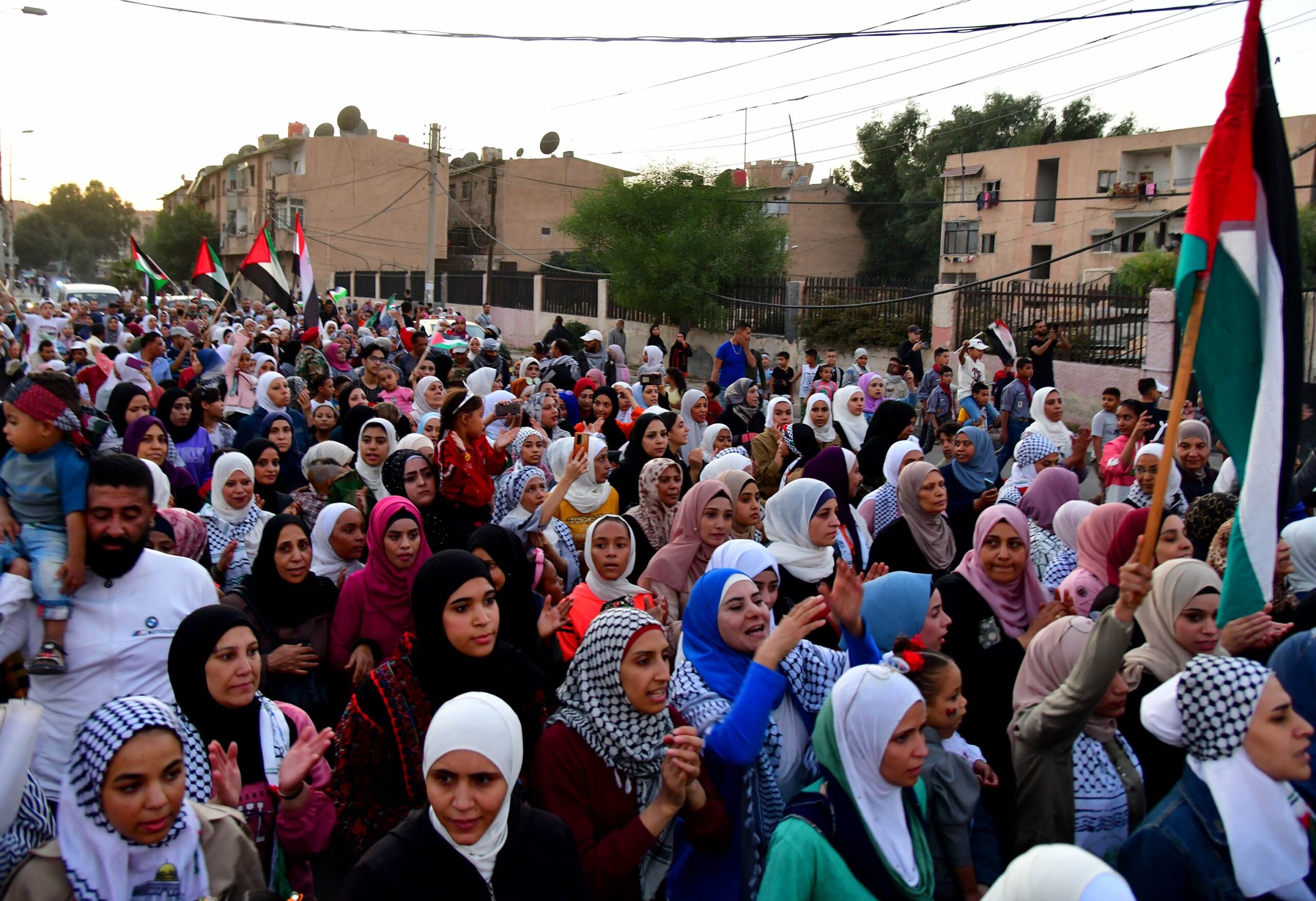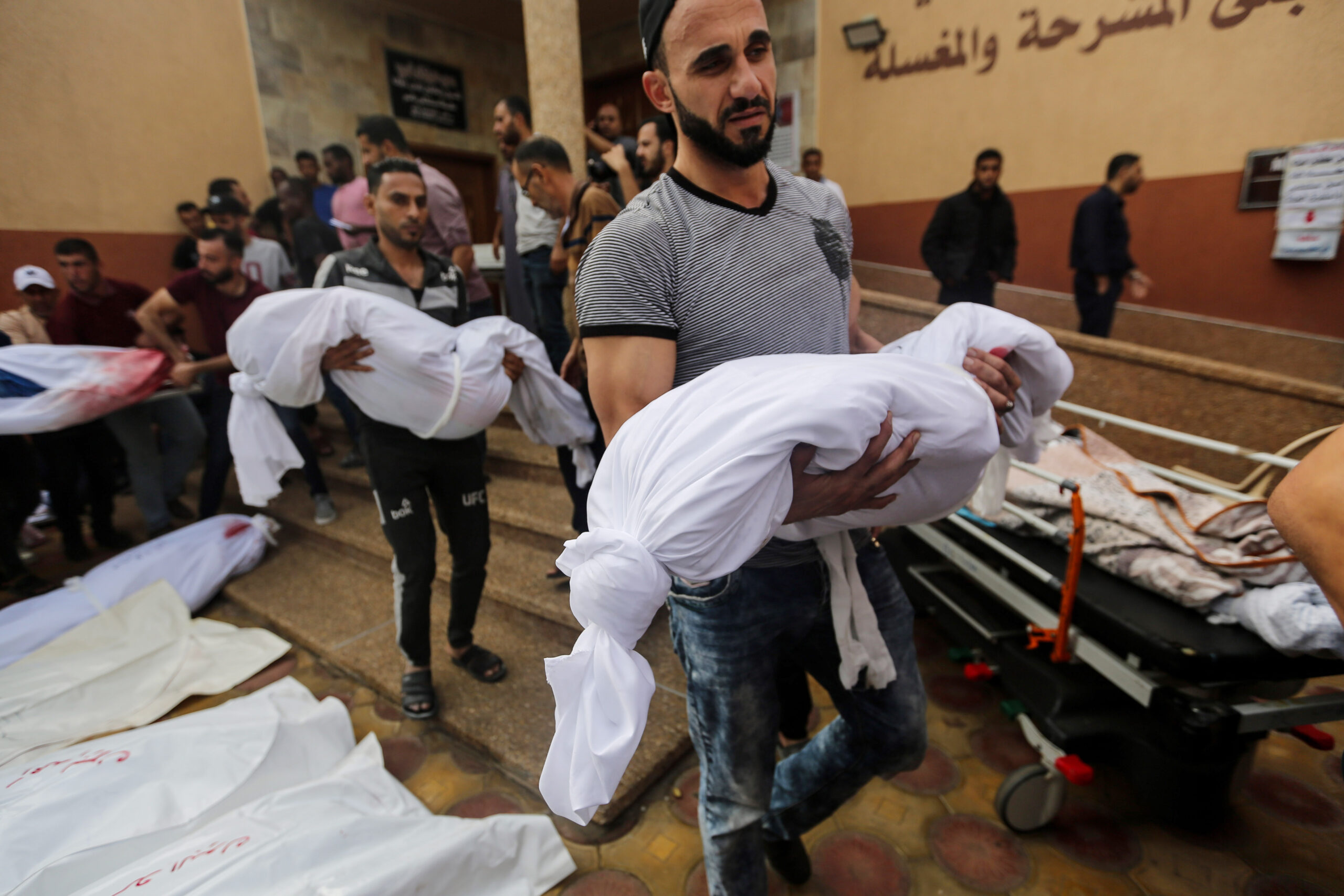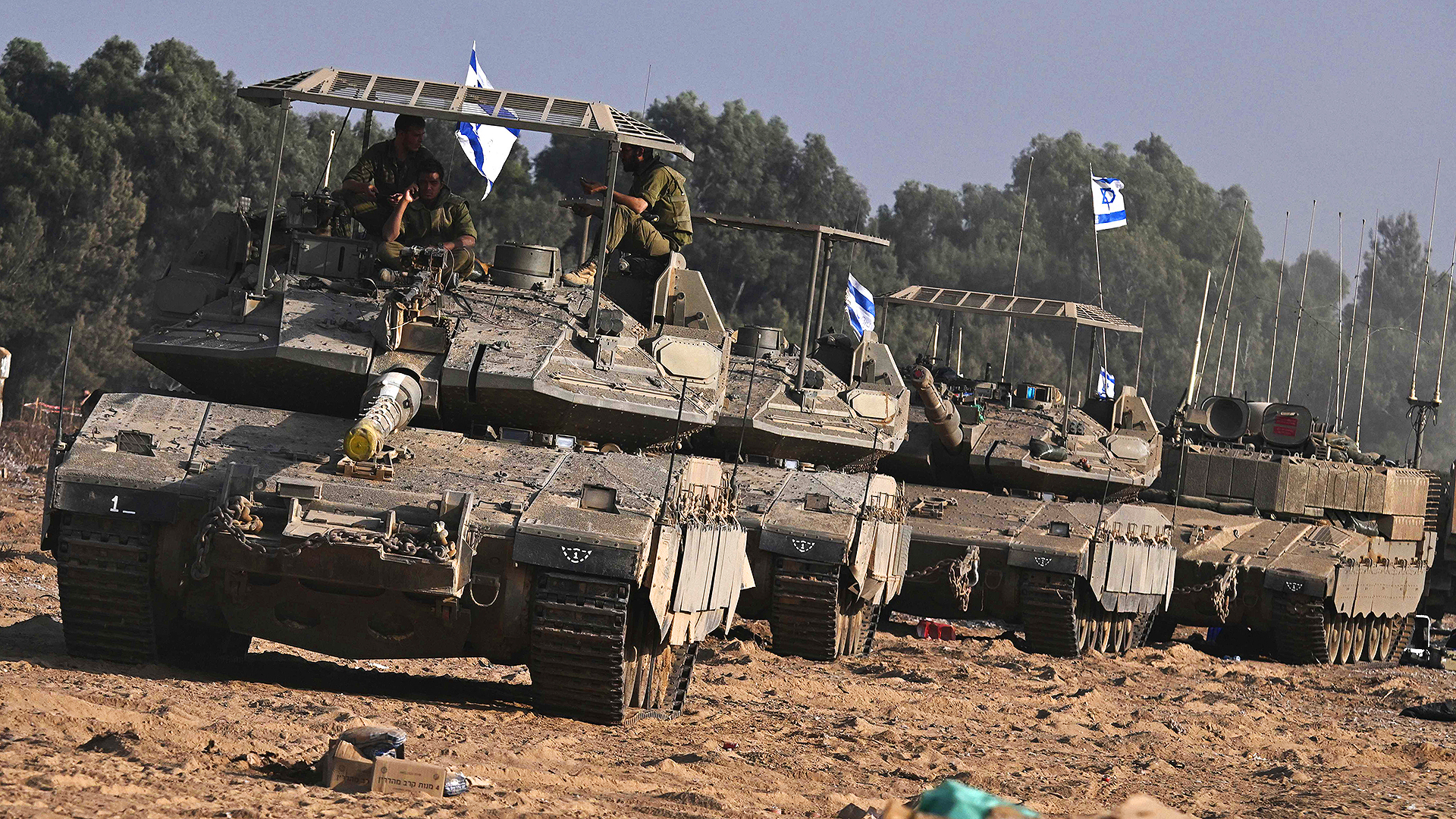Israel has agreed to temporarily delay its ground invasion of Gaza after a request from the U.S. to get its air defenses in place to protect American troops in the region, The Wall Street Journal is reporting. The publication cited U.S. and Israeli officials.
The Pentagon, as we noted earlier this week, is scrambling to deploy one Terminal High Altitude Area Defense (THAAD) battery and several Patriot batteries to the region. That move comes in the wake of increasing attacks on U.S. forces in Syria and Iraq as well as a nine-hour-long engagement the Arleigh Burke-class guided-missile destroyer USS Carney had last week. The vessel knocked down four Houthi land attack cruise missiles and more than a dozen drones. The U.S. is shipping multiple air defense systems to protect U.S. troops serving in Iraq, Syria, Kuwait, Jordan, Saudi Arabia and the United Arab Emirates, the Journal reported.
“U.S. officials have so far persuaded the Israelis to hold off until those pieces can be placed, as early as later this week,” according to the publication.
“Israel is also taking into account in its planning the effort to supply humanitarian aid to civilians inside Gaza, as well as diplomatic efforts to free more of the hostages held by Hamas, officials said.”
But the biggest concern is protecting American forces.
There have been at least 13 attacks on U.S. troops in Iraq and Syria, using drones and missiles, which have resulted in the death of one American contractor and the destruction of an American drone, U.S. officials said. At least two dozen troops were injured in Syria and another 10 in Iraq, defense officials told the Journal, nearly all of them minor.
Any ground invasion of Gaza is going to face tremendous challenges, which you can read more about in our report here.
Concerned about arms shipments from Iran to its regional proxies, Israel carried out its fourth attack this month on Aleppo International Airport on Wednesday, according to several media reports. The attack came as tensions along Israel’s northern borders with Syria and Lebanon have increased since the start of the latest Israel-Hamas war on Oct. 7.
“The Israeli enemy carried out an air attack from the direction of the Mediterranean Sea, west of Latakia, targeting Aleppo International Airport,” a Syrian military source told state TV, according to Al-Arabiya.
The strike caused no injuries, the SANA state news agency said, according to The Times of Israel. The damage was limited to the airport’s runway, forcing it to be closed for repairs for several days.
Israel, as we have noted in the past, has also carried out attacks on the Damascus airport as well.
There was no immediate comment on the strike from the Israel Defense Forces (IDF), which does not generally report on individual strikes in Syria, The Times of Israel reported.
However, the IDF did announce early Wednesday that it had struck several Syrian military targets after rockets were fired from Syria toward Israeli communities in the Golan Heights several hours earlier. SANA, citing a Syrian military source, said eight soldiers were killed and another seven were wounded in the overnight Israeli airstrike in the Daraa area.
The IDF said it sees Syria, along with Lebanon, as part of a northern front. Israeli Lt. Col. Peter Lerner stated that Israel responded to attacks against it from Syria.
“There is a concern that the northern front in itself, from Syria all the way across to Lebanon, will increase its hostilities toward Israel,” he told Sky News.
The latest strike on Aleppo International Airport was “the fourth time [its runway] has been hit in recent weeks, following strikes on October 12, 14, and 22,” The Times of Israel reported. “It was due to open on Wednesday after repairs following the last strike. Israel is believed to be stepping up efforts to prevent the shipment of advanced weapons from Iran to its various Middle East proxies, chief among them Hezbollah.”
Previous strikes sparked large protests in Syria.

The Syrian Observatory for Human Rights (SOHR) says that including this latest strike on Aleppo International Airport, Israel has conducted 42 attacks in Syria so far this year.
SOHR says it documented “31 airstrikes and 11 rocket attacks by ground forces, during which Israel targeted several positions in Syria, destroying nearly 91 targets, including buildings, weapons and ammunitions warehouses, headquarters, centers and vehicles. These strikes killed 83 combatants and injured 103 others.”
Hezbollah’s leader held talks on Wednesday in Beirut with senior Hamas and Palestinian Islamic Jihad figures in a key meeting of three top anti-Israel militant groups amid the war raging in Gaza, The Associated Press reported Wednesday.
In a brief statement after the meeting, Hezbollah leader Hassan Nasrallah agreed with Hamas’ Saleh al-Arouri and Islamic Jihad’s leader Ziad al-Nakhleh on the next steps that the three — along with other Iran-backed militants — should take at this “sensitive stage” in the Middle East.
Their goal, according to the statement carried on Hezbollah-run and Lebanese state media, was to achieve “a real victory for the resistance in Gaza and Palestine” and halt Israel’s “treacherous and brutal aggression against our oppressed and steadfast people in Gaza and the West Bank.”
No other details about what they discussed were provided, the AP reported.
As those leaders met, the situation in the north remains tense.
“Following the initial report regarding sirens that sounded in northern Israel, four launches were identified toward Israeli territory,” the IDF reported. “No interceptors were launched in accordance with protocol.”
Israel says its military carried out “wide-scale attacks” in Gaza based on information provided by its ISA intelligence service.
The Israeli Defense Forces (IDF) “struck several terrorists and Hamas infrastructure, including terror tunnel shafts, military headquarters, weapons warehouses, mortar launchers and anti-tank missile launchers,” the IDF said on Telegram.
The targets included Hamas operations that the IDF claimed were preventing Gazans from fleeing south to avoid the massive Israeli bombardment and oppressing internal Gaza rivals.
The IDF said it struck the Hamas “emergency operational apparatus, including war rooms, infrastructure and military headquarters.”
Hamas’ emergency operational apparatus “was responsible for setting up blockades that prevented Gazans from evacuating to safer areas in the southern Gaza Strip,” the IDF said. Hamas has told people not to head south, but has denied interfering in any such efforts.
Additionally, the IDF said it also struck “military infrastructure and command centers of Hamas’ security apparatus, which is responsible for overseeing the terrorist organization in the Gaza Strip and arresting and imprisoning Hamas’ opponents.”
The IDF also claimed it killed the commander of the Hamas North Khan Yunis sector.
Hamas decried the attacks, saying they are causing a serious humanitarian crisis and placing the healthcare system on the verge of collapse.
There are shortages of medical personnel, medicine, medical equipment and emergency vehicles, Hamas said on Telegram. The problems are exacerbated by the cut-off by Israel of electricity and fuel to the Gaza Strip.
Hamas called on the world to “stand up to its responsibilities to end the brutal occupation and stop the barbaric aggression against our people” and to “support the health sector urgently with medical staff, medicines, medical equipment, first aid, and field hospitals, and put pressure on everyone to bring everything necessary into the health system.”

Israel also said it carried out raids in the West Bank, arresting scores of suspected terrorists.
“Many forces of the IDF, the Shin Bet and the Mageb operated tonight in many centers throughout the Judea and Samaria Division and the Bekaa and Valleys Brigade to counter terrorism and arrested 68 wanted persons suspected of involvement in terrorist activities. Fifty-eight of them are active in the terrorist organization Hamas.”
The IDF released video it said shows the elimination of Hamas frogmen trying to carry out an attack near a military base close to Zikim in the south Israel. You can read more about that incident in our initial reporting here.
The Wall Street Journal took a deep dive into the smuggling of arms through Jordan into the West Bank that threatens both the Hashemite Kingdom as well as the region.
“Using drones, secret airline flights and a land bridge that traverses hundreds of miles and at least four national borders, the smuggling operation is raising the specter of a new conflagration in the war between Israel and Palestinians,” the publication reported. “It also poses a growing threat to Jordan, a staunch U.S. ally which borders Israel and the West Bank and has been struggling to contain a growing flow of drugs and arms.”
“Iran wants to turn Jordan into a transit area for weapons going into Israel,” Amer Al-Sabaileh, founder of Security Languages, a counterterrorism think tank in Amman, told the Journal. “But my fear is that the weapons might be used in Jordan as well. Where is the easiest place in the Middle East to punish the U.S. and the West? Jordan.”
“The bulk of Iranian weapons to Palestinians go into the West Bank, particularly to the Palestinian Islamic Jihad, a militant group allied with Hamas,” a senior Jordanian security official told the Journal. The official said networks of smugglers, assisted by the Syrian government and Iranian-backed militias like Hezbollah, were growing.
Speaking to CNN, Jordan’s Queen Rania accused Western leaders of a “glaring double standard” for failing to condemn the deaths of civilians under Israeli bombardment in Gaza, as Israel’s war on Hamas threatens to destabilize relations between US and Arab leaders.
In an exclusive interview with CNN’s Christiane Amanpour, Rania said, “The people all around the Middle East, including in Jordan, we are just shocked and disappointed by the world’s reaction to this catastrophe that is unfolding. In the last couple of weeks, we have seen a glaring double standard in the world.”
“When October 7 happened, the world immediately and unequivocally stood by Israel and its right to defend itself and condemned the attack that happened … but what we’re seeing in the last couple of weeks, we’re seeing silence in the world,” she told CNN.
Turkish President Recep Tayyip Erdogan on Wednesday issued his strongest words of support yet for Hamas.
“Hamas is not a terrorist organization, it is a liberation group, ‘mujahideen’ waging a battle to protect its lands and people,” he told lawmakers from his ruling AK Party, Reuters reported.
Erdogan also called for an immediate ceasefire between Israeli and Palestinian forces and said Muslim countries must act together to secure a lasting peace in the region.
In addition, Erdogan decried Western powers that have voiced support for Israel’s retaliation against Hamas, saying “Western tears shed for Israel are a manifestation of fraud.”
Many of Turkey’s NATO allies consider Hamas a terrorist group, and Erdogan’s comments drew a swift rebuke from Italy’s Deputy Prime Minister Matteo Salvini, who said they were “grave and disgusting and did not help with de-escalation.”
Yesterday, we told you about a press conference held by Yocheved Lifschitz, 85, was one of two women, along with Nurit Yitzhak, released Monday by Hamas.
Today, Qatar’s foreign minister said that hostage negotiations with Hamas over the more than 200 people it took hostage during its Oct. 7 attack on Israel continue, The Times of Israel is reporting.
“Regarding the progress on the hostage negotiation, it’s still ongoing,” Sheikh Mohammed bin Abdulrahman Al Thani, who also serves as Qatar’s prime minister, said during a news conference with his Turkish counterpart in Doha on Wednesday. “If we compare where we started and where we are right now, there is some progress and some breakthrough and we will remain hopeful.”
The negotiations, he added, “are still ongoing and at any moment of time, I think that if we will be able to get along between the two parties, I think we will see some breakthroughs hopefully soon.”
Tzahi Hanegbi, the head of Israel’s National Security Council, tweeted today that he is “pleased to say that Qatar is becoming an essential party and stakeholder in the facilitation of humanitarian solutions.”
This is a developing story. We will provide updates when there is new information to report about the Israel-Hamas war.
Update: 2:08 PM EST –
During a press briefing before a cabinet meeting, Israeli Prime Minister Benjamin Netanyahu appeared to concede there will be a delay, but insisted that the invasion will happen.
“We are preparing for a ground incursion. I won’t specify when, how, how many. I also won’t detail the range of considerations, most of which the public is not aware of,” he said, according to The Times of Israel. “And that’s the way it is supposed to be. This is the way, so that we protect our soldiers’ lives.”
“The timing of the operation is unanimously determined by the cabinet that runs the war along with the chief of the General Staff, ” Netanyahu said. “When we enter Gaza later on in our fighting, we’re going to take the toll – the full price from those terrorists who carried out those atrocities of Hamas-ISIS.”
Update: 5:20 PM EST –
A U.S. military base in northeast Syria came under rocket attack Wednesday, a U.S. official told The War Zone. There were no injuries or damage.
The official, who spoke on the condition of anonymity to discuss operational details, said one rocket landed inside the base, near the Abu Hajar Airport, and two rockets landed outside it.
The official did not say who was behind the attack, but a loose collective of Iranian-backed militias in the region took credit.
“The Mujahideen of the Islamic Resistance in Iraq targeted the American occupation base at ‘Abu Hajar Airport – Kharab al-Jir’ in northeastern Syria, with a missile salvo, and directly hit its targets,” the group, calling itself the Islamic Resistance in Iraq said on its Telegram channel.
Update: 6:44 EST –
Air Force Brig. Gen. Pat Ryder, the Pentagon’s top spokesman, issued an update on the numbers of troops injured during drone attacks on U.S. bases in Iraq and Syria.
“Between Oct. 17-18 (ET), 21 U.S. personnel received minor injuries due to drone attacks at Al Assad Airbase, Iraq and Al-Tanf Garrison, Syria. All members returned to duty. It is important to note, in some cases service members may report injuries such as TBI several days after attacks occur, so numbers may change. We will continue to work closely with U.S. Central Command to provide updates as appropriate.”
Contact the author: howard@thewarzone.com
